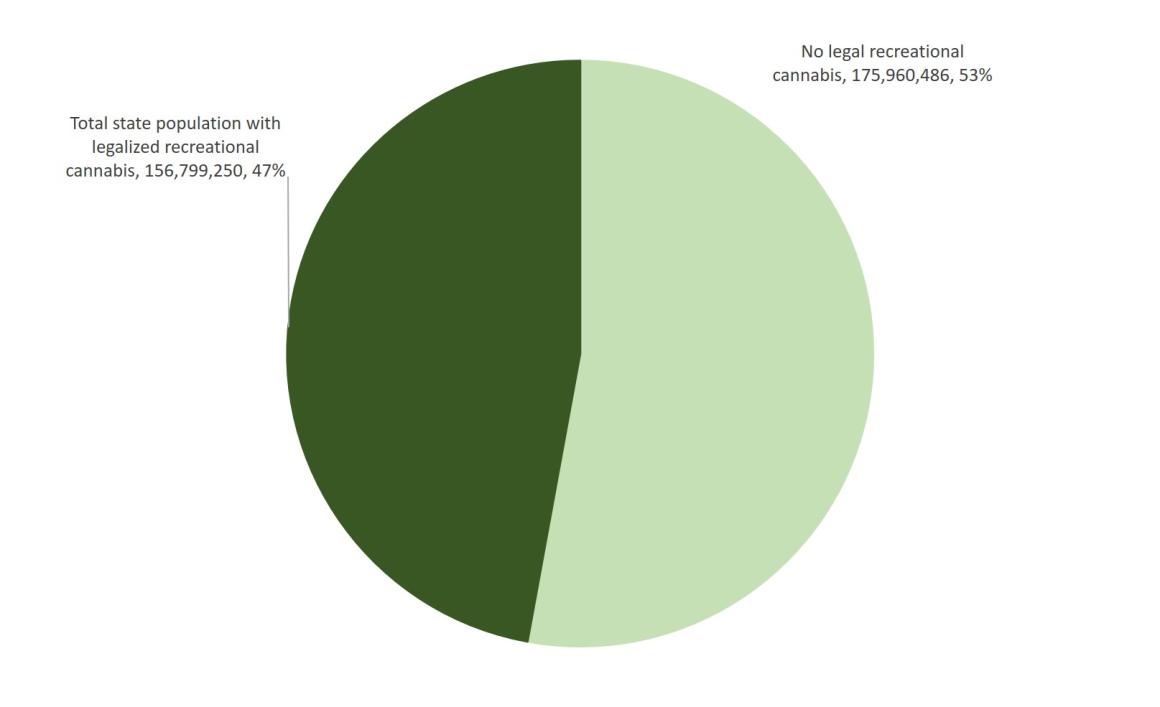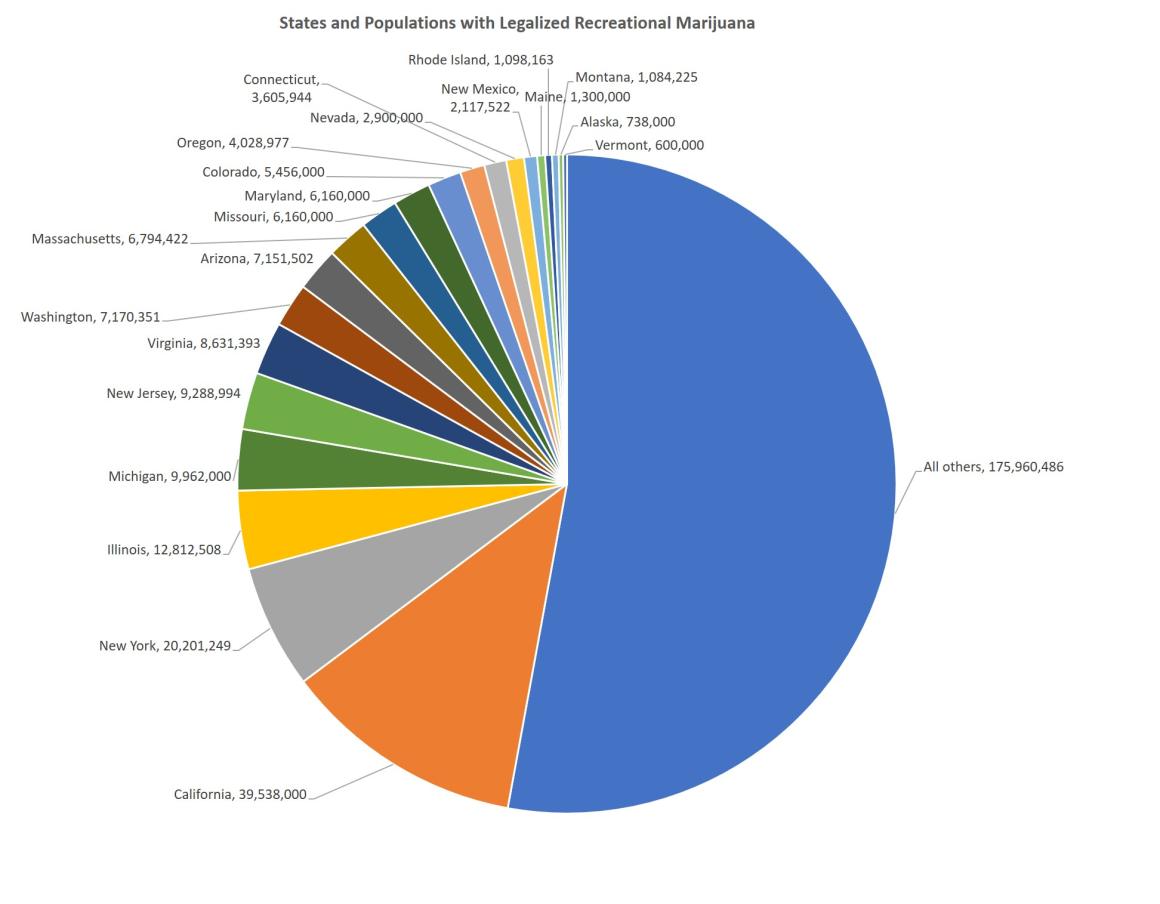Over the past year, three US states have enacted new legislation legalizing recreational marijuana within their borders. In May 2022, recreational cannabis became legal in Rhode Island, and the same occurred in Missouri in December of last year. In the wake of the 2022 election, in which Maryland voters approved Maryland Question 4, recreational use became legal in that state as well. With the addition of Rhode Island, New Hampshire—where cannabis is "only" decriminalized and legal for medical purposes—is now the only state in New England where recreational marijuana is not legal. Missouri joins Alaska and Montana as one of the handful of "red states" that have legalized recreational use as well. Now, with these three states approving recreational use, more than
Topics:
Ryan McMaken considers the following as important: 6b) Mises.org, Featured, newsletter
This could be interesting, too:
Nachrichten Ticker - www.finanzen.ch writes Die Performance der Kryptowährungen in KW 9: Das hat sich bei Bitcoin, Ether & Co. getan
Nachrichten Ticker - www.finanzen.ch writes Wer verbirgt sich hinter der Ethereum-Technologie?
Martin Hartmann writes Eine Analyse nach den Lehren von Milton Friedman
Marc Chandler writes March 2025 Monthly
Over the past year, three US states have enacted new legislation legalizing recreational marijuana within their borders. In May 2022, recreational cannabis became legal in Rhode Island, and the same occurred in Missouri in December of last year. In the wake of the 2022 election, in which Maryland voters approved Maryland Question 4, recreational use became legal in that state as well. With the addition of Rhode Island, New Hampshire—where cannabis is "only" decriminalized and legal for medical purposes—is now the only state in New England where recreational marijuana is not legal. Missouri joins Alaska and Montana as one of the handful of "red states" that have legalized recreational use as well.
Now, with these three states approving recreational use, more than 156 million Americans now live in states where the possession and use of marijuana has been effectively legalized in a manner similar to alcoholic beverages. That's 47 percent of the US population. It is now simply incorrect to say "marijuana is an illegal drug in the United States" just as it is wrong to say "abortion is illegal in the United States." The fact is, such things are legal in some parts of the United States, and illegal in others.
Proportion of US Population by Cannabis Legalization Status
Notably, Rhode Island is also one of a growing number of states where recreational cannabis has been legalized through the legislative process rather than through statewide referenda or voter initiatives. Initially, recreational legalization was only politically possible through voter initiatives, as legislators refused to approve legalization themselves. The first successful cases of this were in Colorado and Washington State in 2012, and they were followed by Alaska and Oregon in 2014. Since then, recreational cannabis has been legalized through a variety of methods in sixteen other states for a total of twenty-one.
Some Republican politicians have even attempted to ratchet up federal prosecutions. For example, in 2018, then attorney general Jeff Sessions rescinded the Cole Memo. This was part of an effort to reassert greater federal control of cannabis policy. Yet congressional delegations from states where recreational cannabis is legal—both Republican and Democrat—have shown an unwillingness to support federal efforts in this regard. As a result, Congress voted to deny the Justice Department funds to enforce federal laws against medicinal marijuana in 2017. Sessions's plan received bipartisan opposition in Congress. Bipartisan efforts at federal legalization have been repeatedly introduced, such as the "Strengthening the Tenth Amendment through Entrusting States (STATES) Act" which, is essentially a "states' rights" bill supported by both parties in the name of reining in the drug war. (An antilegalization bloc, based mostly in southern states, has been able to kill efforts to strengthen more localized control in drug policy.)
These state-level movements to ignore or oppose federal policy are all firmly rooted in ideas of federalism, decentralization, and the Tenth Amendment of the Bill of Rights. From the prohibitionists who cling to centralized political power, however, we routinely hear the same slogans and pro-Washington legal theories about "federal supremacy" or how whatever Congress says is "the law of the land."
Both conservatives and the Left support these ideas when it serves their purposes. The Left, of course, wants uniform rule from Washington when it comes to guns. Conservatives have wanted the same for drugs. Republican attorneys general even sued Colorado in an attempt to impose federal drug laws on the state. What these Republicans wanted was essentially a federal ruling rendering localism and the Tenth Amendment null and void. Fortunately, they failed.
This centralizing impulse, of course, is very popular in Washington. We hear it frequently from those deeply mistaken constitutional scholars who want federal judges to use the "Incorporation Doctrine" to decide what is and what is not legal in every state. These people—both conservatives and leftists—can often be found angrily declaring that federal law is essentially sacrosanct and that state-level nullification "ain't gonna happen." The reality, however, is that it has happened and is happening.
After all, political and ideological realities are such that state-level legalization has effectively meant marijuana has become de facto legal in nearly half of the country. The strategy has also helped to illustrate the potential for success with state-level legal efforts at weakening or nullifying federal law. Proimmigration groups have tried similar tactics in some states, such as California. Similarly, some anti-gun-control policy makers—as in Missouri—have passed legislation in which state officials are prevented from enforcing federal law within state borders. Those who love the Washington regime and the status quo will no doubt continue to press for reform only at the center. These people continue to cling to the long-discredited idea that Washington will be "fixed" if we "elect the right people." Good luck with that.
Tags: Featured,newsletter


